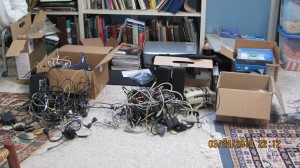e-Waste-ing away

On Saturday, an organization in the town next to me is collecting dead electronics as in anything that "runs on batteries or plugs in." Oh, am I ready for this.
Here's what I have for them: a Samsung 46-inch DLP TV that doesn't work; a Maytag 6000 BTU air conditioner that works, but is unused; failing Klipsch computer speakers; HP PCS 1610 printer that always performed poorly due to a lousy paper feed; three desktop PCs and two broken laptops from my kids; Alder Royal solar calculator which works sometimes; an old Northern Telecom phone that lost its ring; many unused power supplies; old cell phones; an ancient Linksys router; a flaky Maxtor backup drive and other e-junk.

I am no exception. Everyone I know has unused electronics accumulating in attics, basements, garages, breezeways and home offices. We're drowning in this stuff, but getting rid of it properly isn't easy.
My trash disposal company doesn't take it at any price, but referred me to a recycler named Box Q in Georgetown, Mass. They take on electronics on a la carte basis: TVs $15-$30; printers $5 and monitors $10. They take PCs for free and recycle the parts.
In the video below to strains of "Taking Care of Business," BoxQ workers show what happens to dead electronics when they show up at its warehouse.
"TVs are the biggest problem," says BoxQ sales manager Mark Bell. "The CRT (in older sets) has to be taken out and all the metals and plastics separated. We wrap them up and send them out."He didn't know what percentage of electronics end up in landfills, but it's easy to toss a cell phone, NiCad battery (very toxic!) or old router into the trash. Who'd ever see it?
[Interestingly, BoxQ does a single hard disk wipe to protect privacy, but Bell says most people remove them and drill holes in the disk just to sure confidential data does not fall into the wrong hands. What happens to hard disks after that is anyone's guess.]
Wikipedia, the ultimate source on everything, says electronics comprise only two per cent of trash in landfills, but accounts for 70 per cent of the heavy metals. Americans throw away 30 million computers annually, says Wikipedia:
"The EPA states that unwanted electronics totaled 2 million tons in 2005. Discarded electronics represented 5 to 6 times as much weight as recycled electronics.[2] The Consumer Electronics Association says that U.S. households spend an average of $1,400 annually on an average of 24 electronic items, leading to speculations of millions of tons of valuable metals sitting in desk drawers."
State-sponsored electronics recycling programs such as E-Cycle Washington and CalRecycle are picking up steam, but with extreme financial pressures, governments are not prioritizing such initiatives. "Every town is set up differently. There is no statewide plan (in Massachusetts)," Brown said.
Maine just moments ago announced the first Consumer Products Framework which broadly makes recycling the law with respect to things like packaging and electronics. California, Oregon and Minnesota have similar legislation pending.
I also wondered how much responsibility the vendors bear in paying for the cost of recycling the stuff they make and put into the environment. Several are fighting Washington State's tough e-waste laws that demand they pony up for recycling centers, according to a story in the Wall Street Journal. It's a difficult problem: many of the companies are hurting and even if they go out of business, they still have to pay fees as their products live on.
Staples has an aggressive computer e cycling program as does Hewlett Packard, which buys back any brand of unwanted computers. I got a quote on a Dell XPS notebook in poor condition and it said it would pay me $10.77 although I am not sure I have the same configuration as HP said I did. After all, the computer is dead.
Many sites say how easy it is to e-cycle, but let's face it: ditching dead electronics is costly and piecemeal. But it's worth putting the effort and money to make sure electronics are disposed of properly or at minimum, safety stored in your home.
For people who toss electronics in the trash headed for landfills, Bell has a simple warning: "It will get them in the end."
Follow me on Twitter.
This post was originally published on Smartplanet.com